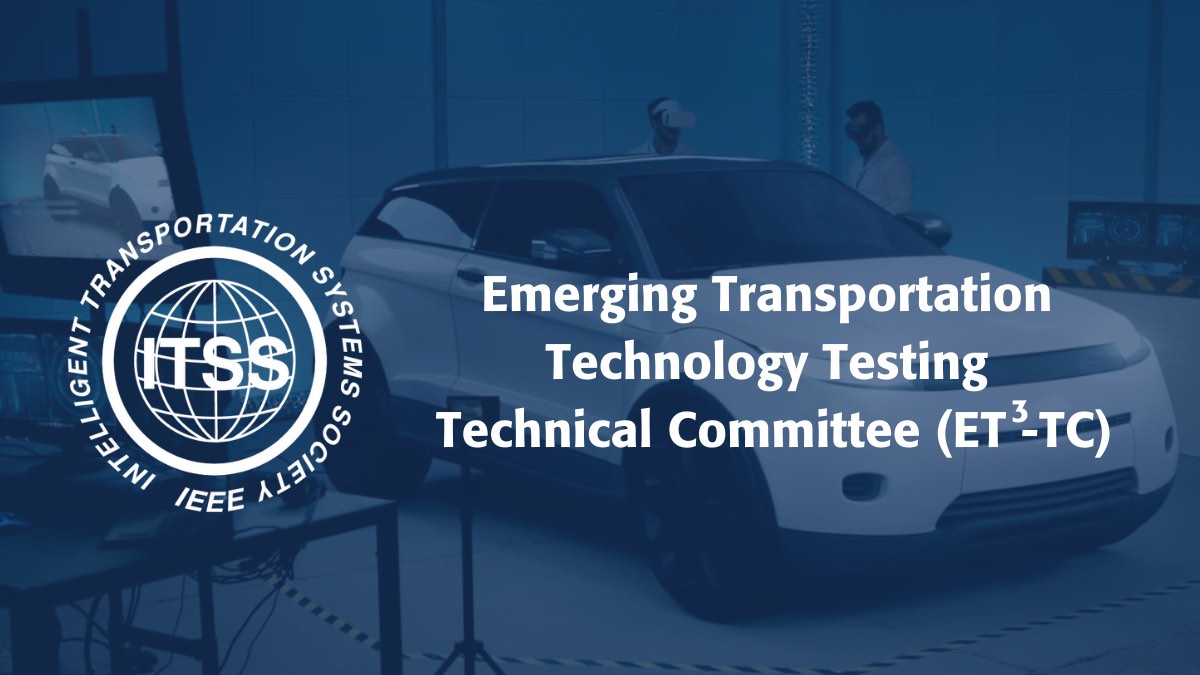
Chair: Xiaopeng (Shaw) Li
Co-Chair(s): Xiaobo Qu, Xin Wang
Advisor: Vacant
Short Description
The Emerging Transportation Technology Testing (ET3) Technical Committee (TC) is a sub-committee of the IEEE Intelligent Transportation Systems Society. The aim of ET3 is to establish a community of leaders from academia , industry, and government focused on sustaining and synergizing the concerted efforts on testing environments, methods, and protocols. The TC aims to facilitate the utilization of existing test facilities and promoting their collaborations with other people across the world. The ET3-TC also creates platforms and publication venues for testing methods and supports the standardization of implementation protocols.
Emerging transportation technologies, such as communications (e.g., connected vehicles), automation, electrification, and mode diversification (e.g., modular vehicles, shared mobility, urban air mobility, hyperloop, boring), have constantly been transforming transportation systems. Various analytical and simulation models have been proposed over the past decades to simulate, model, and analyze these emerging technologies for planning, operating, managing, and evaluating near-future transportation systems. In recent years, studies on testing these technologies in a valid environment have rapidly increased, particularly for problems in a system context with multiple components interacting with each other. Proper tests are critical for validating the assumptions and outcomes of the theoretical models, demonstrating the benefits of system-level models, and transforming modeling outcomes into implementable technologies and tangible societal impacts.
Realizing the importance of testing, intensive efforts have been recently put into developing and sharing testbeds for emerging technologies, including utilizing naturalistic data, conducting closed-track or real-world field experiments, and incorporating hardware components in the loop of systematic simulation. Various testing methods (e.g., design of experiments, importance sampling, accelerated testing) are being developed to accomplish the best outcomes within resource constraints. Further, it is imperative for governments and industries to adopt standard protocols to verify and implement the testing results. The main topics of interest to ET3 include (but are not limited to) the following:
- Emerging transportation technologies, including but not limited to communications, automated vehicles, electric vehicles, modular vehicles, urban air mobility, smart rail, hyperloop, boring, etc.
- Testbed development and sharing, including hardware-in-the-loop, closed-track testbeds, and naturalistic tests.
- Testing methods, e.g., scenario design, accelerated tests, human-machine interface, etc.
- Testing standards and industry implementation.
ET3 organized a workshop on connected automated vehicle (CAV) testbeds at the 2021 IEEE ITSC conference. ET3 plans to host committee meetings with all members to establish the community and set up the work plan in the coming years. In addition, ET3 will also seek publication opportunities (e.g., special issues in appropriate journals, e.g., Communications in Transportation Research) to promote the development of Emerging Transportation Technology Testing.
Goal
1 data platform and 10 representative datasets are summarized for connected and automated vehicle tests.
- ETS-Data platform (https://ets-data.sciopen.com/home)
ETS-Data is a publicly accessible database in the transportation community, that provides indispensable materials for result replications, including data, codes, scripts, simulation, experiment design and other essential files.
- Waymo Open Dataset (https://waymo.com/intl/en_us/dataset-download-terms/)
The Waymo Open Dataset is high-resolution sensor data collected using ADAS-equipped vehicles operated by Waymo drivers in various environments, objects, and weather conditions.
- Connected Vehicle Pilot (CVP) Open Dataset (https://datahub.transportation.gov/stories/s/Connected-Vehicle-Pilot-CVP-Open-Data/hr8h-ufhq/)
The CVP team integrates CV research concepts into practical and effective equipment to enhance vehicle operation. The CVP team collected vehicle trajectory data and lane information to facilitate independent evaluations of the use of CV technology with connected roadside infrastructure on real roadways.
- University of South Florida (USF) Open Datasets Collected in the United States (https://github.com/CATS-Lab)
The Connected and Autonomous Transportation Systems laboratory at USF has collected different ADAS data sets, including the mixed traffic platoon dataset and the ADAS-equipped vehicle platooning dataset.
- Vanderbilt ACC Dataset (https://vanderbilt.app.box.com/v/accData)
Vanderbilt University collected the Vanderbilt ACC dataset. It included car-following data of commercial ADAS-equipped vehicles with ACC enabled.
- Ford Campus Dataset (http://robots.engin.umich.edu/SoftwareData/Ford)
The University of Michigan and the Ford research team established a dataset for an ACC vehicle (a modified Ford® F-250 pickup truck). These data were collected around the Ford research campus and downtown Dearborn, Michigan, from November 2009 to December 2009.
- Ford Multi-AV Seasonal Dataset (https://avdata.ford.com/home/default.aspx)
The Ford research team presents a challenging multi-agent seasonal dataset. Ford autonomous vehicles (enabled by ACC) are applied in collecting data on different days and times during 2017–2018.
- Lyft Dataset (https://level-5.global/data/)
Lyft dataset has consisted of sensor input and maps, detected traffic agents, predicted agent motion, and path is taken by AVs.
- OpenACC Dataset (https://data.europa.eu/data/datasets/9702c950-c80f-4d2f-982f-44d06ea0009f?locale=en)
The European Commission collected the OpenACC Dataset. It provides an overview of the behavior of commercial ACC systems under different driving conditions.
- Oxford RobotCar Dataset (http://robotcar-dataset.robots.ox.ac.uk)
The Oxford RobotCar Dataset contains over 100 repetitions of one subject ACC vehicle operating on a consistent route through Oxford, United Kingdom, captured over a period of more than 1 year.
- pNEUMA Dataset (https://open-traffic.epfl.ch/)
pNEUMA is an open large-scale dataset of naturalistic trajectories of half a million vehicles that have been collected by a one-of-a-kind experiment by a swarm of drones in the congested downtown area of Athens, Greece.
Milestones
- Coming soon
Committee Activities
- Jan 2023 – Establishing the committee.
Committee member distributions: US 29, Australia 2, Europe 10, Asian 21. - Jan 2023 to Present (May) – Biweekly committee meeting.
8 times committee meeting.
Provided representative ET3 sites over the world.
Built collaboration relationships with ASCE CAV Impacts Committee.
Working on drafting ET3 guideline and white paper. - Oct 2023 – Will organize a special session on IEEE-ITSC 2023.
Topic: Global Advances and Future of Testbeds on Automated Connected & Electrical (ACE) Vehicles.
Committee Members
- Soyoung Ahn
- Yaobin Chen
- Leila Hajibabai
- Jorge Laval
- Lingxi Li
- Henry Liu
- Xiang Liu
- Srinivas Peeta
- Huizhao Tu
- Dan Work
- Zhigang Xu
- Zsolt Szalay


